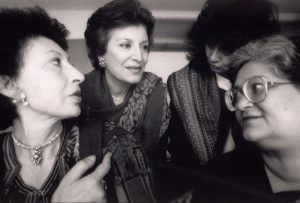Fatema Mernissi, the Moroccan sociologist widely known as a pioneer in Middle Eastern Women’s studies, passed away this week. It is difficult for me to speak of her – a friend, ally, and colleague of over two decades – in the past tense. I first met Fatema at the Middle East Studies Association Conference in November 1992. Fatema, Nawal El Sadaawi, and I were speakers at the first and only MESA plenary ever dedicated to gender. It was an exhilarating time, just after the fall of the Soviet Union. There was a brief era of global peace and all things seemed possible. We were upbeat about the Middle East, about women, about human rights. Fatema and I connected instantly. She brought me the gift of her extraordinary compatriots Amina Lemrini and Rabéa Naciri, co-founders of L’Association Démocratique des Femmes du Maroc, which became one of the five founding partner organizations of Women’s Learning Partnership (WLP).

There followed twenty years of exciting, interesting meetings in Berlin, Casablanca, Washington DC, and elsewhere. Fatema was a vibrant woman, blessed with a creative intelligence, who discovered new ways of looking at events, personalities, and subject matter. Books were not only sources of knowledge, but originators of life-changing ideas. She took pride in the strength, humor, imagination, and intelligence of women of her own background and saw their under-representation in the global dialogue on women a loss for the women’s movements. She worked hard to bring understanding of the complexity of MENA women’s lives to the West. She enjoyed her travels to the U.S. and her role as featured speaker at many prestigious venues.
The Iraq war changed all that. Fatema said she would not come to the U.S. until the war was over, and she never did. Her pathbreaking books, among them The Veil and The Male Elite, The Forgotten Queens of Islam, and Islam and Democracy, were standard reading at colleges and universities around the world. But she came to believe that her ideas would be better received and understood if she were to write fiction. She asked me to recommend a “how-to book” and was exuberant about Henry James’ The Art of Fiction. Perhaps she was right. Her Dreams of Trespass captures her humor and lively personality better than any of her other works. She was delighted that the book was translated into Chinese and that her works were being enjoyed and studied in India. During our years of friendship Fatema became ever more passionate about the role of civil society. In this – as in her academic work – she was original. She organized “Caravans” to the Atlas mountains to introduce the work of grassroots women to western journalists and scholars. She was an early advocate of the possibilities of new technologies. She was ever hopeful that connecting civic activism and technology would make possible the kind of dialogue and advocacy across all borders, real and artificial, that separate people and would help build more peaceful, tolerant societies. We have lost a leader whose intensity, steadfastness, and innovative spirit have made a real difference in the work and lives of many.
Mahnaz Afkhami, Women’s Learning Partnership, Article Link
